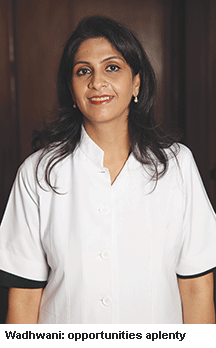Pressure from the entertainment and glamour industries and the corporate sector is driving the demand for qualified skin care specialists, aka dermatologists
 ACCORDING TO INDUSTRY estimates, aggregate annual expenditure on the skin and beauty care industry in India is currently $950 million (Rs.5,770 crore per year) and increasing at a CAGR (compounded annual growth rate) of 15-20 percent. Pressure from the entertainment and glamour (movies, television, fashion) industries, and the corporate sector, for sleek well-groomed professionals, is driving the demand for qualified skin care specialists, aka dermatologists. Consequently with people of all ages and professional backgrounds anxious to look good, dermatology has transformed into a lucrative career option.
ACCORDING TO INDUSTRY estimates, aggregate annual expenditure on the skin and beauty care industry in India is currently $950 million (Rs.5,770 crore per year) and increasing at a CAGR (compounded annual growth rate) of 15-20 percent. Pressure from the entertainment and glamour (movies, television, fashion) industries, and the corporate sector, for sleek well-groomed professionals, is driving the demand for qualified skin care specialists, aka dermatologists. Consequently with people of all ages and professional backgrounds anxious to look good, dermatology has transformed into a lucrative career option.
Dermatology is a branch of medicine which involves medical and surgical interventions. Dermatologists treat diseases as well as cosmetic problems of the skin, hair, scalp, and nails, with a new genre of young specialists foraying into cosmetic dermatology.
Professional dermatologists tend to be graduates or postgrads of a medical college or university. To be eligible for admission into medical college, aspirants need to clear Plus Two with physics, chemistry and biology. For super specialisations, a three-year MD programme after completing MBBS is mandatory.
Among prominent medical institutes offering dermatology programmes are the All India Institute of Medical Sciences, New Delhi; Sun Institute and School of Dermatology, New Delhi; Government Medical College and Hospital, Chandigarh; Department of Dermatology, Pondicherry Institute of Medical Sciences; Dr. MGR Medical University, Tamil Nadu; NRS Medical College, Kolkata; Bangalore Medical College and Research Institute.
Moreover, since postgrad syllabuses/curriculums tend to be textbook rather than technology focused, a growing number of dermatologists are signing up for short-term diploma programmes in aesthetic or cosmetic dermatology, contact dermatitis, trichology, chronological photo ageing, cutaneous surgery, and laser treatment programmes in the US, Europe and South-east Asia.
Employment opportunities are plenty for qualified dermatologists in government and private hospitals, nursing homes and pharma companies. Most dermatologists start their careers in group practice clinics, research and academia. After a few years’ experience, they may have the option of going into private practice.
Qualified professional dermatologists are well-compensated worldwide. In India, starting remuneration is between Rs.12,000-21,000 per month. For the modestly experienced, pay packages zoom to Rs.1.6-3 lakh per month. Even in a Central government hospital, a mint-fresh MD can expect to earn Rs.60,000 per month, whereas in academia a professor/department head is paid Rs.1.5 lakh per month. For dermatologists in private practice, Rs.4-5 lakh per month is de rigueur and in the US, salaried specialists earn between $280,000-480,000 (Rs.1.71-2.93 crore) per year.
“There’s no dearth of employment opportunities for dermatologists in hospitals and private clinics, some of whom like Kaya Skin Clinic have launched a chain of clinics countrywide,” observes dermatologist and cosmetologist Dr. Poonam Wadhwani, who runs a flourishing private clinic in the Ratan Tata Medical Centre, Mumbai.
An MBBS graduate of the MGM Medical College, New Bombay (1997), Dr. Wadhwani pressed on to acquire a diploma in dermatology and venereal diseases from the Bombay Port Trust Hospital, Wadala in 2001. Soon after, she signed up to work with well-known cosmetologist Dr. Rekha Seth (2002-2010), in the course of which she acquired wide experience in cosmetic dermatology. In 2011, Dr. Wadhwani went solo, and within a short span of three years has established a busy private practice.
For the medically inclined, a career in dermatology offers another valuable perk — a balanced and flexible working life. “Emergency skin care and rejuvenation calls are rare,” says Wadhwani.
Moreover, opportunities for continuous learning are plenty in this still-evolving profession. “Numerous conferences and workshops are organised in India and abroad, and a plethora of short-term updation and advanced programmes are offered by international associations,” says Dr. Wadhwani.
Indra Gidwani